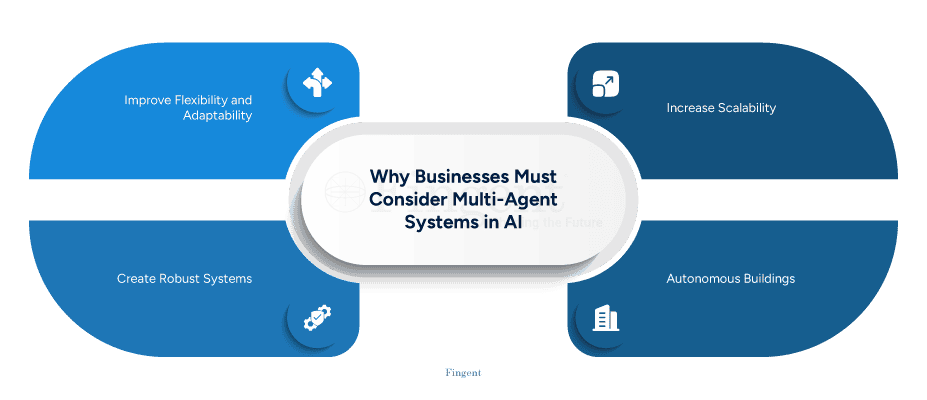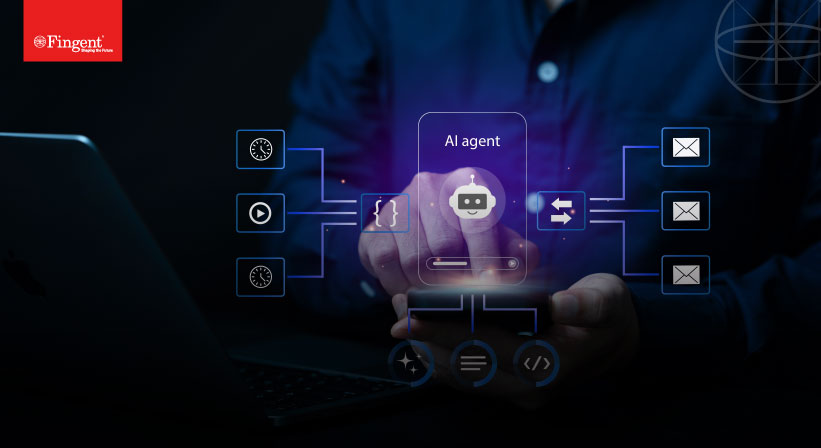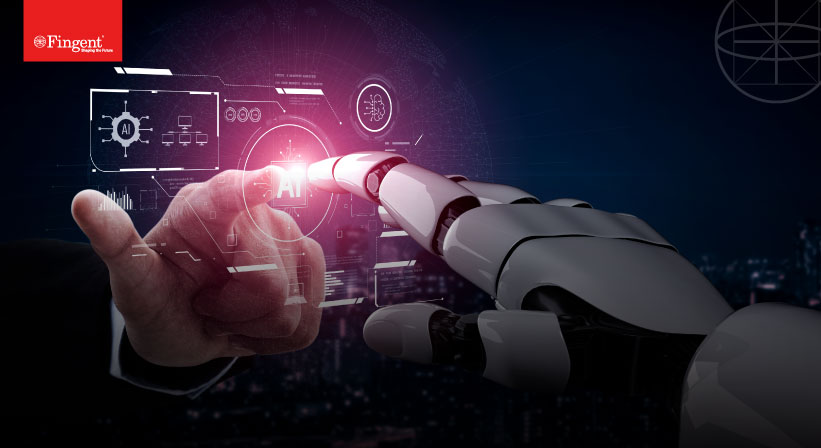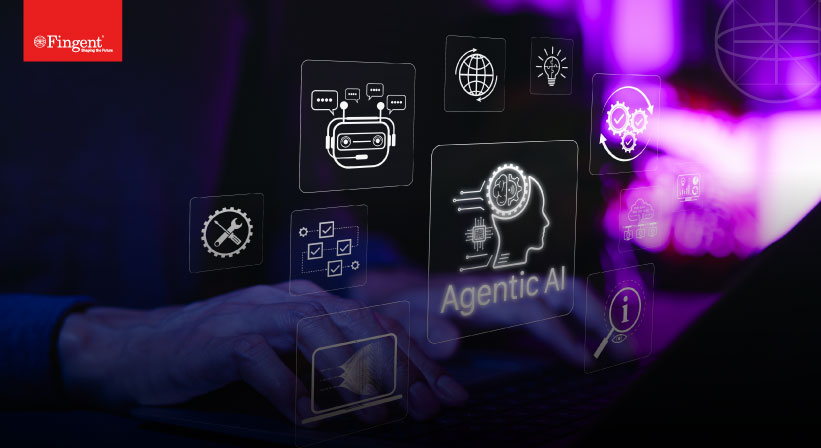Multi-Agent System In AI Explained and Why Businesses Should Care
We’ve all used single AI models, whether it’s a bot answering questions or an algorithm working seamlessly in the background. But can you imagine what would happen when many AI systems come together to enhance efficiency? That’s what a multi-agent system in AI does.
A multi-agent system in AI, also known as MAS, is an artificial intelligence computation system that consists of many agents interacting with each other and with their environment to achieve their individual or collective goals. In contrast to single-agent systems, where one primary agent undertakes decisions, applications of multi-agent systems in AI enable agents to work through cooperation, competition, and coordination with each other.
While multi-agent systems are complicated to build, they provide a massive helpful edge to individual entrepreneurs who may be struggling to compete with larger organizations. The key, then, is to simplify it so it works for you. Exactly how you want it! This article will discuss all that, and the benefits and challenges of multi-agent AI. Read on!
Dive Into The World of Artificial Intelligence! Explore How AI Can Transform Your Business Operations
How Multi-Agent Intelligence Works?
According to Roots Analysis, AI agent applications in customer service and virtual assistants are predicted to account for 78.65% of the market share by 2035. Worth a deep dive, don’t you think?
Since we have established what multi-agent AI systems are, let’s dive into their makeup and how they work.
The foundation of MAS is artificial intelligence agents. These, in essence, are systems or programs that can autonomously perform tasks requested by the user or another system.
How do they function? Large language models (LLMs) are the powerhouses behind it. Natural language processing techniques are tapped into to understand and respond to user inputs. Agents follow a no-nonsense, strategic step-by-step process to resolve problems. When they feel the need to call on external tools, they alert the user to do what is needed.
If Multi-agent intelligence is broken down into pieces, it consists of four major components –
- Agents: As discussed earlier, these are individual parts of the system that have their own abilities, knowledge, and goals. Agents can range from simple assistant bots to advanced robots that can learn and adapt. Agents are considered the blood that courses through the veins of MAS.
- Shared Environment: This is defined by the space in which the agents operate. This could be a physical place, like a factory. Or it could be a virtual place, like a digital platform. Either way, this environment will determine how the agents act and interact.
- Interactions: Once the right agents are placed in the most appropriate environment, they proceed to interact with each other through various methods, such as collaboration or competition. These dialogues are vital for the system’s workings and improvement.
- Communication: Agents are often required to communicate to share information, negotiate, and/or coordinate their actions.
The two most important behaviors of Multi-agent intelligence are –
- Flocking: Here, agents have a single aim and some organization or supervisor to coordinate their behavior.
- Swarming: This is where the simple decentralized interactions of simple AI agents come together collectively. Shared context is the crux of this complex and amazing collaboration.
Business Benefits of Multi-Agent Systems

Hands down, multi-agent AI systems can and have solved many intricate and real-world tasks. With unmatched ease and efficiency at that. At its root, its main benefit is that it makes complex processes more intelligent and efficient. Here are some reasons why multi-agent systems work so well for businesses.
1. Adds flexibility and adaptability
Research indicates that due to AI, 81% of companies react faster to market shifts. MAS can add to this benefit as it can easily adapt to business models, needs, and goals.
2. Extra hands to increase scalability
If the complexity of a problem increases, extra AI agents can be seamlessly introduced to steer new tasks or responsibilities. This level of scalability makes MAS suitable for a wide range of applications and dynamic environments.
3. Creates a robust system
Multi-agent systems improve fault tolerance. This means that if one AI component fails or malfunctions, another takes over without missing a beat. This ensures that there is continuity to MAS and can be critical for industries like healthcare and finance.
4. Domain Specialization
The ingredient for the efficiency of multi-agent systems is delegation. Each agent is assigned a specific domain expertise. In contrast, single-agent systems need one agent to multitask and handle tasks in various domains. In multi-agent systems, each agent focuses on their own unique task. Focus means more efficiency and reduced risk of manual errors.
Building Trust In AI: Enabling Businesses to Strategize an Ethical AI Future
Challenges of Multi-Agent Systems
Just as every aspect of Artificial Intelligence has its fair share of challenges, there are several push-backs in designing and implementing Multi-agent intelligence, including:
1. Agent malfunctions
Foundation models are a type of artificial intelligence model trained through techniques like fine-tuning, prompting, and transfer learning. They are subjected to massive, diverse datasets to perform a wide range of general tasks. Sometimes, multi-agent systems built on the same foundation model can experience shared obstacles. This can cause a system-wide failure of all agents involved. It also exposes vulnerability to adverse attacks.
2. Coordination complexity
This is perhaps the greatest challenge with developing multi-agent systems – the complexity of creating agents that can coordinate and negotiate with one another. This cooperation is vital for a multi-agent system to function at full potential.
3. Unpredictable behavior
Some multi-AI agents that are set to perform autonomously and independently in decentralized networks can exhibit conflicts or unpredictable behavior. This can make the detection of issues and their management difficult.
How do you deal with these challenges?
Fingent Can Help!
Fingent can help organizations implement multi-agent systems by offering custom AI software development, cloud solutions, and expertise in designing and deploying intricate AI systems. Fingent’s expertise in AI can help businesses create specialized, unique, and autonomous multi-AI agents that are programmed to collaborate and solve complex problems. They also manage workflows and automate processes at scale.
Fingent designs and implements workflows for AI agents to ensure harmonious collaboration and efficient execution of tasks. We incorporate human oversight and intervention to highlight critical workflows. We also help create the necessary infrastructure, such as MCP servers, to connect and manage AI agents and their interactions. Lastly, Fingent uses multi-agent systems to automate and optimize complex business procedures, thus leading to greater efficiency and cost savings.
Stay up to date on what's new

Recommended Posts

20 Feb 2026 B2B
What Are Multi-Agent Systems? Architecture, Benefits, and Real-World Examples
Work isn’t linear anymore, and that changes everything! It brings Multi-Agent Systems into context like never before. Think about it. A customer order triggers procurement. Procurement works its effect on……

12 Feb 2026 B2B
AI System Integrators — The Key to Enterprise-Ready Intelligence
AI is everywhere. Most businesses are trying it out. Very few manage to make it work. Fewer succeed in scaling it effectively. You can be one of the few. How?……

30 Jan 2026 B2B
Getting Started with Agentic AI Development for Your Enterprise
Traditional automation excels at repetition. RPA follows scripts. GenAI generates insights. But when conditions change mid-process, suppliers miss dates, forecasts shift, or approvals stall - these tools stop short. They……

22 Jan 2026 B2B
What Is Holding Businesses Back from AI Adoption?
Your company spent two million dollars on an AI project. The pilot looked strong. The demo worked. Then the results flatlined. You are not alone! Most companies face AI adoption……
Featured Blogs
Stay up to date on
what's new




















































